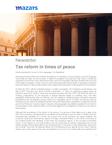
Tax reform in times of peace
According to Article 338 of the Political Constitution of Colombia, in times of peace, only the Congress may create tax laws. On the contrary, in states of exception, the executive may issue or modify tax regulations to avert the crisis, being these taxes (and such legislative decrees) limited to the very end of the state of exception. These rules are enshrined to guarantee the principle of separation of powers that is the basis of a democratic system and to respect the reservation of law proper to the tax sphere.
On May 26, 2017, without Colombia being in a state of exception, the President issued Decree-Law 883 of 2017 "whereby Law 1819 of 2016 is amended (...)". After six introductory pages where an extensive account is made of what was the peace process with the FARC and what has been the existing jurisprudence on the issuance of special decrees based on enabling rules, and after repeatedly insisting that, with such decree, are not creating or modifying taxes (a situation expressly prohibited by the Constitution and by Article 2 of Legislative Act 01 of 2016), the decree ends by modifying the tax reform by establishing that mining and hydrocarbon exploitation companies may be part of the "Works for Taxes" program. Likewise, two paragraphs are added to establish how the term of prescription of the collection action is to be interrupted for the obligations of those who are part of this program.
Although the amendment of the reform is not serious, it is serious to have taken such a step, since with it the executive transgressed the constitutional boundaries to put its hand in matters that are constitutionally forbidden to it. Under the excuse that no tax elements are being modified, the executive could have reformed the regime of foreign controlled entities, or the crime of omission of non-existent assets and liabilities, or the entire tax procedure regime, or the concept of beneficial owner, or the regime of non-profit entities, and we would have to witness undaunted how our tax reality changes without being able to say anything about it. This action is also illegitimate, since there are currently more than 30 lawsuits before the Constitutional Court against the tax reform filed by citizens who, being aware of the law, proceeded to sue it, but if six months after its enactment, the Government can modify it -by decree- the function of legal control, which is in the hands of the Courts, is hindered.
The violation of the principle of "no taxation without representation" has given rise to deep disagreements that have ended in revolutions, as was the case of the American Revolution of 1760, in which the thirteen colonies revolted before the British Parliament because they were not being given representation in the processing of the Sugar Act or the Stamp Act.
Apparently some good citizen has already taken this matter to the Constitutional Court, since in the web page of said Corporation a lawsuit (with file number RDL0000018) has been filed against the referred decree-law by means of which the tax reform is modified.


